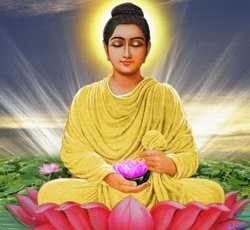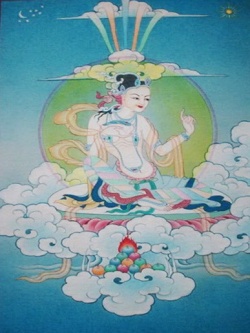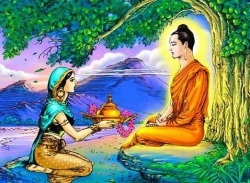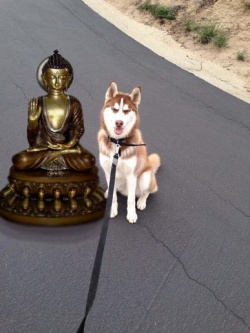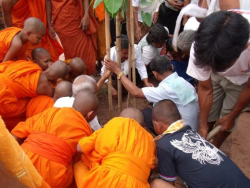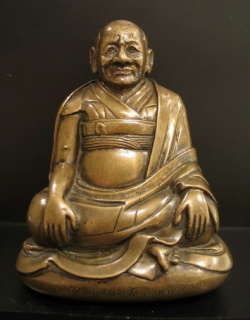Difference between revisions of "Criticism of Buddhism"
(Created page with " <poem> I have stumbled upon a very well written criticism of Buddhism that I can highly recommend. Of course, I had to add my comments – this is what I posted in r...") |
|||
| (3 intermediate revisions by 2 users not shown) | |||
| Line 1: | Line 1: | ||
| − | + | {{DisplayImages|1520|1370|2750|2056|2158|1415|2721}} | |
| − | + | I have stumbled upon a very well written [[criticism]] of [[Buddhism]] that I can highly recommend. Of course, I had to add my comments – this is what I posted in response to Vexen’s analysis: | |
| − | |||
Thank you so much for posting your [[criticism]] of [[Buddhism]], Vexen. As I mentioned in another comment, it is so desperately needed here in the [[West]] because everybody – from Sam Harris to {{Wiki|Richard Dawkins}} – seems to think that [[Buddhism]] is harmless, [[peaceful]], and consistent with [[science]]. | Thank you so much for posting your [[criticism]] of [[Buddhism]], Vexen. As I mentioned in another comment, it is so desperately needed here in the [[West]] because everybody – from Sam Harris to {{Wiki|Richard Dawkins}} – seems to think that [[Buddhism]] is harmless, [[peaceful]], and consistent with [[science]]. | ||
| Line 16: | Line 15: | ||
4. [[World]] [[Buddhist]] [[Morality]] | 4. [[World]] [[Buddhist]] [[Morality]] | ||
| + | |||
I am afraid that record is so clean because we Westerners are largely (kept) [[ignorant]] of the bloody parts. Read Brian Victoria’s “[[Zen]] at [[War]]” and your statement will, unfortunately, be shown to be false. Maybe there is less {{Wiki|blood}} but [[Buddhism]] is not the [[peaceful]] [[religion]] that we’ve been led to believe. (Okay, so maybe I’d just reword the last sentence of your first paragraph: “Compared with other powerful [[religions]], [[Buddhism]] appears to be saintly.” – rather than “is”). | I am afraid that record is so clean because we Westerners are largely (kept) [[ignorant]] of the bloody parts. Read Brian Victoria’s “[[Zen]] at [[War]]” and your statement will, unfortunately, be shown to be false. Maybe there is less {{Wiki|blood}} but [[Buddhism]] is not the [[peaceful]] [[religion]] that we’ve been led to believe. (Okay, so maybe I’d just reword the last sentence of your first paragraph: “Compared with other powerful [[religions]], [[Buddhism]] appears to be saintly.” – rather than “is”). | ||
6. Inhumane Dismissal of [[Suffering]] | 6. Inhumane Dismissal of [[Suffering]] | ||
| + | |||
I think this is really the most central [[element]] of [[Buddhist teaching]]: [[suffering]]. I would add to your arguments that “[[suffering]]” in [[Buddhism]] is defined solely as an {{Wiki|individual}} problem and thus the solution can only be found at that level. [[Buddhism]] ignores completely any systemic creation of [[suffering]], which makes the [[Four Noble Truths]] incomplete at best, false at worse. I will shamelessly advertise my own Website now, by asking you to look there for more details on that argument. Btw, the [[Zen]] [[priest]] Ichikawa Hakugen would agree with your assessment here, at least according to Brian Victoria’s summary of Hakugen’s argument (Victoria is a [[Soto Zen]] [[priest]]): “The [[doctrine]] of [[karma]], with its corollary [[belief]] in [[good and bad]] [[karmic]] retribution, tends to serve as a kind of [[moral]] [[justification]] for {{Wiki|social}} inequality.” Keep that quote handy the next [[time]] someone accuses you of [[ignorance]] – a [[Zen]] [[priest]] [[ignorant]] of [[Buddhism]]?!? | I think this is really the most central [[element]] of [[Buddhist teaching]]: [[suffering]]. I would add to your arguments that “[[suffering]]” in [[Buddhism]] is defined solely as an {{Wiki|individual}} problem and thus the solution can only be found at that level. [[Buddhism]] ignores completely any systemic creation of [[suffering]], which makes the [[Four Noble Truths]] incomplete at best, false at worse. I will shamelessly advertise my own Website now, by asking you to look there for more details on that argument. Btw, the [[Zen]] [[priest]] Ichikawa Hakugen would agree with your assessment here, at least according to Brian Victoria’s summary of Hakugen’s argument (Victoria is a [[Soto Zen]] [[priest]]): “The [[doctrine]] of [[karma]], with its corollary [[belief]] in [[good and bad]] [[karmic]] retribution, tends to serve as a kind of [[moral]] [[justification]] for {{Wiki|social}} inequality.” Keep that quote handy the next [[time]] someone accuses you of [[ignorance]] – a [[Zen]] [[priest]] [[ignorant]] of [[Buddhism]]?!? | ||
7. [[Buddhist Psychology]] is too {{Wiki|idealistic}} | 7. [[Buddhist Psychology]] is too {{Wiki|idealistic}} | ||
| + | |||
Wow! That is a point I hadn’t [[thought]] about yet. | Wow! That is a point I hadn’t [[thought]] about yet. | ||
8. Conclusion | 8. Conclusion | ||
| + | |||
Because of my comment to #4, I don’t agree with your assessment of [[Buddhism]] as “a wonderful [[religion]] socially, participating as a [[principle]] player in all [[forms]] of global [[peace]] & stability movements.” I think because of #6 and #7, it is inherently [[dangerous]], just like any other [[religion]]. I completely agree with your second paragraph, though. | Because of my comment to #4, I don’t agree with your assessment of [[Buddhism]] as “a wonderful [[religion]] socially, participating as a [[principle]] player in all [[forms]] of global [[peace]] & stability movements.” I think because of #6 and #7, it is inherently [[dangerous]], just like any other [[religion]]. I completely agree with your second paragraph, though. | ||
I would add that at least one of the tools developed in [[Buddhism]] might have some usefulness for some [[people]]: [[mindfulness]] [[meditation]]. It has been shown to reduce [[stress]], help with [[pain]] management, lower {{Wiki|blood}} pressure, and prevent the recurrence of depressive episodes (see the work around Mindfulness-Based [[Stress]] Reduction and Mindfulness-Based [[Cognitive]] Therapy). As you pointed out in #7, this tool is certainly no panacea and it might not be useful for everyone. | I would add that at least one of the tools developed in [[Buddhism]] might have some usefulness for some [[people]]: [[mindfulness]] [[meditation]]. It has been shown to reduce [[stress]], help with [[pain]] management, lower {{Wiki|blood}} pressure, and prevent the recurrence of depressive episodes (see the work around Mindfulness-Based [[Stress]] Reduction and Mindfulness-Based [[Cognitive]] Therapy). As you pointed out in #7, this tool is certainly no panacea and it might not be useful for everyone. | ||
| − | + | ||
{{R}} | {{R}} | ||
[http://www.rabe.org/criticism-of-buddhism/ www.rabe.org] | [http://www.rabe.org/criticism-of-buddhism/ www.rabe.org] | ||
| − | [[Category:Buddhism | + | {{NewSourceBreak}} |
| + | [[Criticism]] of [[Buddhism]], much like the [[criticism]] of [[religion]] in general, can be found from those who disagree with or question the assertions, [[beliefs]] or other factors of various [[schools of Buddhism]]. Some [[Buddhist]] denominations, many predominantly [[Buddhist]] nations, and {{Wiki|individual}} [[Buddhist]] leaders have been criticized in one way or another. Sources of [[criticism]] can come from, for example, {{Wiki|agnostics}}, skeptics, "anti-religion" [[philosophers]], rationalists, proponents of other [[religions]], or by [[Buddhists]] espousing reform or simply expressing their dislike. | ||
| + | |||
| + | There are two criteria of [[criticism]] of any system of [[thoughts]]; one is based on [[rational]] {{Wiki|evaluation}} of its [[doctrines]], texts, teachings and practice, and the other criterion pertains to the [[consistency]] or inconsistency of the practitioners in applying the teachings. | ||
| + | |||
| + | ==Historical [[Criticism]]== | ||
| + | |||
| + | [[Buddhism]] was founded in [[India]], where [[Hinduism]] was prevalent, and to date it remains so. The {{Wiki|Orthodox}} [[Hindus]] viewed [[Buddhism]] as [[atheistic]]. Legendary [[Kumārila Bhaṭṭa]] called that [[Buddha]] as the one who "transgressed [[dharma]] laid down for [[ksatriyas]] and he took himself to the profession of a [[religious teacher]], one who 'deceives himself' and acts contrary to the [[Vedas]]." | ||
| + | [[Criticism]] of [[Buddhist]] [[Doctrines]] | ||
| + | |||
| + | Consequently, various teachings - and also their later commentaries – differ widely between various [[Buddhist]] schools, depending on which [[sutra]] is in [[concern]]. For this [[reason]], [[criticism]] of a certain [[Buddhist doctrine]] may apply only to a certain interpretation of that particular [[doctrine]], or that particular school of [[Buddhism]]. Nevertheless there are common teachings to all branches of [[Buddhism]], which are the [[subject]] of [[debate]] and [[investigation]] in {{Wiki|academic}} circles. | ||
| + | |||
| + | ===[[Nihilism]] and Focus on [[sufferings]]=== | ||
| + | |||
| + | Although [[Buddhism]] was compared with {{Wiki|Existentialism}}, however, it was criticized by {{Wiki|Friedrich Nietzsche}}, interpreting [[Buddhism]] as a life-negating [[philosophy]] that seeks to escape an [[existence]] dominated by [[suffering]]. The [[doctrine]] of the [[Four Noble Truths]] was targeted by [[criticism]] for its focus on [[sufferings]]. There are other [[Buddhist teachings]] however, which [[acknowledge]] the [[element]] of [[joy]] in [[life]], for example: the text of the [[Lotus Sutra]] contains scenaries of people’s [[enlightenment]], with a [[mind]] "[[dancing]] with [[joy]]". The [[teaching]] of [[Nichiren Buddhism]] also acknowledges both [[sufferings]] and [[joy]]: “[[Suffer]] what there is to [[suffer]], enjoy what there is to enjoy, regard both [[sufferings]] and [[joy]] as facts of [[life]]”. | ||
| + | |||
| + | ===[[Women in Buddhism]]=== | ||
| + | |||
| + | Admission of women in the {{Wiki|community}} of believers [[Sangha]] took place during the [[time]] of the [[Buddha’s]] [[life]]. After the [[First Buddhist Council]] of [[Theravada Buddhism]] various [[temples]] set more rules of conduct for [[nuns]] [[bhikkunis]] than for [[monks]] [[bhikkus]], seen as a move based on {{Wiki|discrimination}}. The most criticised [[doctrine]] which regards women as {{Wiki|inferior}} to men is found in [[Amida]] [[Buddhism’s]] [[vow]] 35: “The [[Buddha]] established the [[Vow]] of [[transformation]] [women] into men, Thereby vowing to enable women to attain [[Buddhahood]]”. Earlier limitations on [[attainment of Buddhahood by women]] were abolished in the [[Lotus Sutra]] which opened the direct [[path]] to [[enlightenment]] for women equally to men. According to [[Nichiren]]” “Only in the [[Lotus Sutra]] do we read that a woman who embraces this [[sutra]] not only excels all other women but surpasses all men”. | ||
| + | |||
| + | [[Theravada Buddhism]] has been criticized because it treats women, particularly women [[monks]], as {{Wiki|inferior}} to men. Most [[schools of Buddhism]] have more rules for [[bhikkunis]] ([[nuns]]) than [[bhikkus]] ([[monk]]) [[lineages]]. [[Buddhists]] explain that in the [[time]] of the [[Buddha]], [[nuns]] had such problems like safety if they were to be [[ordained]] the same way as [[monks]] who traveled around in the {{Wiki|forest}} and between cities. Thus, more rules have to be created for [[nuns]], for instance: [[nuns]] are forbidden to travel alone. | ||
| + | |||
| + | [[Alexander Berzin]] referred to the [[Dalai Lama's]] statement at the 2007 Hamburg congress: | ||
| + | |||
| + | : Sometimes in [[religion]] there has been an emphasis on {{Wiki|male}} importance. In [[Buddhism]], however, the [[highest]] [[vows]], namely the [[bhikshu]] and [[bhikshuni]] ones, are {{Wiki|equal}} and entail the same rights. This is the case despite the fact that in some [[ritual]] areas, due to {{Wiki|social}} {{Wiki|custom}}, [[bhikshus]] go first. But [[Buddha]] gave the basic rights equally to both [[sangha]] groups. There is no point in discussing whether or not to revive the [[bhikshuni]] [[ordination]]; the question is merely how to do so properly within the context of the [[Vinaya]]. | ||
| + | |||
| + | ==Inconsistencies== | ||
| + | |||
| + | Some practitioners argue that the criticisms levied against the [[Buddhist]] [[religion]] draw on examples from sub-traditions not in consonance to [[Buddhist]] {{Wiki|principles}}. These meta-critiques are similar to those from by practitioners in other [[religious]] [[traditions]]. The lack of {{Wiki|evidence}} of any original teachings or global authority on "true" [[Buddhism]] makes it difficult to substantiate these claims outside of [[practitioner]] circles. | ||
| + | |||
| + | ===Arguments of {{Wiki|secular}} origin=== | ||
| + | |||
| + | Sam Harris, a prominent proponent of New {{Wiki|Atheism}} and [[practitioner]] of [[Buddhist meditation]], claims that many practitioners of [[Buddhism]] improperly treat it as a [[religion]], and criticizes their [[beliefs]] as "{{Wiki|naive}}, petitionary, and superstitious," and claims that such [[beliefs]] impede the adoption of true [[Buddhist]] {{Wiki|principles}}. The former [[Buddhist monk]] [[Stephen Batchelor]] has penned several [[books]] in which he claims that [[Buddhism]] was originally a {{Wiki|secular}} but [[mystical]] system of psycho-spiritual self-improvement. | ||
| + | |||
| + | ===Leaders and {{Wiki|institutions}}=== | ||
| + | |||
| + | Some critics claim that certain [[Buddhist]] {{Wiki|adherents}} and leaders have been {{Wiki|materialistic}} and corrupt with an improper [[interest]] in [[wealth]] and power rather than pursuit of [[Buddhist]] {{Wiki|principles}}. There have been a number of well-publicised {{Wiki|sex}} scandals involving [[teachers]] in [[emerging]] {{Wiki|Western}} [[Buddhist]] groups, even though the [[Vinaya]] expressly forbids any {{Wiki|sexual}} [[activity]] among [[Buddhist]] [[monastics]]. | ||
| + | |||
| + | ==[[War]] and {{Wiki|violence}}== | ||
| + | |||
| + | In {{Wiki|medieval}} {{Wiki|Southeast Asia}}, there were a number of [[Buddhist]] states, including the {{Wiki|Pagan}} {{Wiki|Kingdom}}, the [[Wikipedia:Sukhothai Kingdom|Sukhothai]] {{Wiki|Kingdom}}, and the {{Wiki|Kingdom}} of [[Polonnaruwa]]. In [[Sri Lanka]] especially {{Wiki|modern}} [[monks]] frequently involve themselves in nationalist politics. [[Sri Lankan]] [[peace]] activists such as A. T. Ariyaratne have however also drawn on [[Buddhism]] for inspiration. | ||
| + | |||
| + | [[Japanese Buddhism]] also often received state support. The [[Zen]] [[priest]] Brian Daizen Victoria documented in his [[book]] [[Zen]] at [[War]] how [[Buddhist]] {{Wiki|institutions}} justified [[Japanese]] militarism in official publications and cooperated with the [[Japanese]] {{Wiki|Army}} on the battlefield. In response to the [[book]], several sects issued an [[apology]] for their wartime support of the government. | ||
| + | |||
| + | Christopher Hitchens summarized these issues as a specifically [[Buddhist]] [[desire]] to "put their [[reason]] to [[sleep]], and to discard their [[minds]] along with their sandals." In 2010 Hitchens wrote for the cover of {{Wiki|Confession}} of a [[Buddhist]] {{Wiki|Atheist}}, "...[[Stephen Batchelor]] adds the [[universe]] of [[Buddhism]] to the many fields in which received [[truth]] and [[blind faith]] are now giving way to [[ethical]] and [[scientific]] {{Wiki|humanism}}, in which lies our only real {{Wiki|hope}}." | ||
| + | |||
| + | [[Buddhists]] also have a record of both passive and active [[nonviolence]], often reflected by national {{Wiki|culture}}. In [[Burma]], [[monks]] have advocated [[nonviolence]] during the 2007 anti-government protests amongst many other occasions; [[Engaged Buddhism]] arose in [[Vietnam]] as a means of protest prior to the [[Vietnam]] [[War]]. (see {{Wiki|pacifism}}) Though more recently, [[Buddhists]] in [[Burma]] have been accused of {{Wiki|ethnic}} cleansing of minority Rohingya {{Wiki|Muslims}}. | ||
| + | |||
| + | The [[Buddha]] is quoted in the [[Dhammapada]] as saying, "[[Life]] is dear to all. Comparing others with oneself, one should neither kill nor [[cause]] to kill." | ||
| + | |||
| + | ===Accusation of {{Wiki|violence}}=== | ||
| + | |||
| + | In the 1990s, [[Bhutan]] expelled or forced to leave its [[Hindu]] population in the [[name]] of preserving its [[Buddhist]] {{Wiki|culture}} and [[Wikipedia:Identity (social science)|identity]]. | ||
| + | |||
| + | After the 2008 unrest in the [[Tibetan]] area of the PRC, the official {{Wiki|Chinese government}} stance has been that the [[Dalai Lama]] helped to orchestrate the unrest and {{Wiki|violence}}. A {{Wiki|Chinese}} Ministry of Public {{Wiki|Security}} spokesperson claimed searches of [[monasteries]] in the [[Tibetan]] capital had turned up a large cache of [[weapons]], including 176 guns and 7,725 pounds of explosives. | ||
| + | |||
| + | The {{Wiki|Colombo}} Telegraph reported that "Sri Lanka’s minority {{Wiki|Muslims}} continue to be subjected to {{Wiki|violence}} and persecution, often at the hands of militant [[Buddhists]], who are very active at the grassroots level." | ||
| + | |||
| + | Since March 2013, anti-Muslim riots have flared up in various cities in central and eastern [[Burma]]. The {{Wiki|violence}} has coincided with the rise of the [[Buddhist]] 969 {{Wiki|Movement}}. | ||
| + | |||
| + | ===[[Non-violence]] in [[Nichiren Buddhism]] of [[SGI]]=== | ||
| + | |||
| + | Among the [[Buddhist]] groups which never shared in {{Wiki|violence}} is the Value Creation [[Soka Gakkai]] or [[SGI]], currently “the largest lay believers group in the [[world]]”, which teachings are based on [[Nichiren Buddhism]] {{Wiki|emphasizing}} the sanctity of [[life]] and [[absolute]] [[non-violence]]: “To deprive a being of [[life]] is to commit the gravest kind of [[sin]]”. | ||
| + | |||
| + | While almost all [[Buddhist temples in Japan]] supported the [[war]] in the Pacific during the II WW, [[Soka Gakkai]] [[Buddhists]] refused to comply with the orders of the {{Wiki|military}} government: “The [[Japanese]] government decimated the [[Soka]] Gakkai's pre-World [[War]] II membership by jailing much of its [[leadership]] because of the [[Soka]] Gakkai's refusal to support the [[war]] [[effort]] or to obey laws pertaining to the control of [[religious]] organizations”. Committed to [[nonviolence]], [[SGI]] supports disarmament and teaches the role of {{Wiki|dialogue}}: “....the role of {{Wiki|dialogue}} in the advancement of [[peace]], [[education]], and {{Wiki|culture}}". [[SGI]] [[Buddhists]] share in {{Wiki|social}} movements against {{Wiki|violence}} in {{Wiki|society}} and the organisation is registered at the United Nations (since 1983) as a NGO. | ||
| + | |||
| + | It most however be noted that Makiguchis [[criticism]] was never directed against {{Wiki|Japan’s}} expansionary policy, nor was he at the [[time]] critical of {{Wiki|Japan’s}} [[war]] crimes committed on the {{Wiki|Asian}} mainland. | ||
| + | |||
| + | ==[[Buddhist]] self-criticism== | ||
| + | |||
| + | Critical [[Buddhism]] is a branch of [[Japanese Buddhist]] {{Wiki|scholarship}} which aims to reform [[Buddhism]] through critical examination of its practices and [[philosophy]]. | ||
| + | |||
| + | Many {{Wiki|individual}} [[schools of Buddhism]] are criticized by other practitioners as [[spiritually]] insincere or not [[attached]] to the original teachings of the original [[Buddha]], including [[Sōka Gakkai]], the [[Nichiren Shōshū]], the [[Dhammakaya Movement]], and participants in the [[Dorje Shugden]] controversy. | ||
| + | |||
| + | =={{Wiki|Marxist}} [[criticism]]== | ||
| + | |||
| + | Several critics have criticized [[Tibet]] for maintaining a [[Wikipedia:Feudalism|feudal]] {{Wiki|society}} that exploited peasants and treated them like serfs. The current [[Dalai Lama]], however, has stated that he is in favor of a [[Buddhist]] synthesis with {{Wiki|Marxist}} {{Wiki|economics}}, as he believes that internationalist [[nature]] of {{Wiki|Marxism}} shows [[compassion]] to the poor, which is in line with [[Buddhist teachings]], while capitalism is concerned only with gain and profitability. | ||
| + | {{W}} | ||
| + | [[Category:Criticism of Buddhism]] | ||
Latest revision as of 16:37, 20 March 2014
I have stumbled upon a very well written criticism of Buddhism that I can highly recommend. Of course, I had to add my comments – this is what I posted in response to Vexen’s analysis:
Thank you so much for posting your criticism of Buddhism, Vexen. As I mentioned in another comment, it is so desperately needed here in the West because everybody – from Sam Harris to Richard Dawkins – seems to think that Buddhism is harmless, peaceful, and consistent with science.
I would like to add a few comments, though.
At least in Japan, the social programs you laud were developed as a competition to Christian programs to enable missionary success, i.e., get people to convert to Buddhism rather than Christianity (see Brian Victoria “Zen at War”, p.17)
3. Western Buddhism I think there is a Sangha at least here in the US. But it is different and rather commercialized. People meditate together and listen to Dharma talks and paying for that with “dana” – donations that enable some teachers to afford luxury cars. I do agree with you that the Buddhism that is known in the West is a rather sterilized version that conveniently ignores any of the questionable beliefs or historical abuses.
5. Nirvana and Self (any reason for having 5 before 4 ;-) ) It is interesting that a lot of the Buddhist apologists seem to miss the ultimate goal of Buddhism: to reach enlightenment or nirvana. Anybody who says that is criticized: Buddhists don’t have goals, you’re misunderstanding things, well, just look through the comments here… But if you read Buddhist text (I have only read them in English), it is clear, though, that this is what the goal is. And that’s why we’re reborn here on Earth because it’s the perfect middle ground. Of course, then your question comes up: why do so few of us reach that state? (changing your question slightly, hopefully, though maintaining the idea).
I am afraid that record is so clean because we Westerners are largely (kept) ignorant of the bloody parts. Read Brian Victoria’s “Zen at War” and your statement will, unfortunately, be shown to be false. Maybe there is less blood but Buddhism is not the peaceful religion that we’ve been led to believe. (Okay, so maybe I’d just reword the last sentence of your first paragraph: “Compared with other powerful religions, Buddhism appears to be saintly.” – rather than “is”).
6. Inhumane Dismissal of Suffering
I think this is really the most central element of Buddhist teaching: suffering. I would add to your arguments that “suffering” in Buddhism is defined solely as an individual problem and thus the solution can only be found at that level. Buddhism ignores completely any systemic creation of suffering, which makes the Four Noble Truths incomplete at best, false at worse. I will shamelessly advertise my own Website now, by asking you to look there for more details on that argument. Btw, the Zen priest Ichikawa Hakugen would agree with your assessment here, at least according to Brian Victoria’s summary of Hakugen’s argument (Victoria is a Soto Zen priest): “The doctrine of karma, with its corollary belief in good and bad karmic retribution, tends to serve as a kind of moral justification for social inequality.” Keep that quote handy the next time someone accuses you of ignorance – a Zen priest ignorant of Buddhism?!?
7. Buddhist Psychology is too idealistic
Wow! That is a point I hadn’t thought about yet.
8. Conclusion
Because of my comment to #4, I don’t agree with your assessment of Buddhism as “a wonderful religion socially, participating as a principle player in all forms of global peace & stability movements.” I think because of #6 and #7, it is inherently dangerous, just like any other religion. I completely agree with your second paragraph, though.
I would add that at least one of the tools developed in Buddhism might have some usefulness for some people: mindfulness meditation. It has been shown to reduce stress, help with pain management, lower blood pressure, and prevent the recurrence of depressive episodes (see the work around Mindfulness-Based Stress Reduction and Mindfulness-Based Cognitive Therapy). As you pointed out in #7, this tool is certainly no panacea and it might not be useful for everyone.
Source
Criticism of Buddhism, much like the criticism of religion in general, can be found from those who disagree with or question the assertions, beliefs or other factors of various schools of Buddhism. Some Buddhist denominations, many predominantly Buddhist nations, and individual Buddhist leaders have been criticized in one way or another. Sources of criticism can come from, for example, agnostics, skeptics, "anti-religion" philosophers, rationalists, proponents of other religions, or by Buddhists espousing reform or simply expressing their dislike.
There are two criteria of criticism of any system of thoughts; one is based on rational evaluation of its doctrines, texts, teachings and practice, and the other criterion pertains to the consistency or inconsistency of the practitioners in applying the teachings.
Historical Criticism
Buddhism was founded in India, where Hinduism was prevalent, and to date it remains so. The Orthodox Hindus viewed Buddhism as atheistic. Legendary Kumārila Bhaṭṭa called that Buddha as the one who "transgressed dharma laid down for ksatriyas and he took himself to the profession of a religious teacher, one who 'deceives himself' and acts contrary to the Vedas." Criticism of Buddhist Doctrines
Consequently, various teachings - and also their later commentaries – differ widely between various Buddhist schools, depending on which sutra is in concern. For this reason, criticism of a certain Buddhist doctrine may apply only to a certain interpretation of that particular doctrine, or that particular school of Buddhism. Nevertheless there are common teachings to all branches of Buddhism, which are the subject of debate and investigation in academic circles.
Nihilism and Focus on sufferings
Although Buddhism was compared with Existentialism, however, it was criticized by Friedrich Nietzsche, interpreting Buddhism as a life-negating philosophy that seeks to escape an existence dominated by suffering. The doctrine of the Four Noble Truths was targeted by criticism for its focus on sufferings. There are other Buddhist teachings however, which acknowledge the element of joy in life, for example: the text of the Lotus Sutra contains scenaries of people’s enlightenment, with a mind "dancing with joy". The teaching of Nichiren Buddhism also acknowledges both sufferings and joy: “Suffer what there is to suffer, enjoy what there is to enjoy, regard both sufferings and joy as facts of life”.
Women in Buddhism
Admission of women in the community of believers Sangha took place during the time of the Buddha’s life. After the First Buddhist Council of Theravada Buddhism various temples set more rules of conduct for nuns bhikkunis than for monks bhikkus, seen as a move based on discrimination. The most criticised doctrine which regards women as inferior to men is found in Amida Buddhism’s vow 35: “The Buddha established the Vow of transformation [women] into men, Thereby vowing to enable women to attain Buddhahood”. Earlier limitations on attainment of Buddhahood by women were abolished in the Lotus Sutra which opened the direct path to enlightenment for women equally to men. According to Nichiren” “Only in the Lotus Sutra do we read that a woman who embraces this sutra not only excels all other women but surpasses all men”.
Theravada Buddhism has been criticized because it treats women, particularly women monks, as inferior to men. Most schools of Buddhism have more rules for bhikkunis (nuns) than bhikkus (monk) lineages. Buddhists explain that in the time of the Buddha, nuns had such problems like safety if they were to be ordained the same way as monks who traveled around in the forest and between cities. Thus, more rules have to be created for nuns, for instance: nuns are forbidden to travel alone.
Alexander Berzin referred to the Dalai Lama's statement at the 2007 Hamburg congress:
- Sometimes in religion there has been an emphasis on male importance. In Buddhism, however, the highest vows, namely the bhikshu and bhikshuni ones, are equal and entail the same rights. This is the case despite the fact that in some ritual areas, due to social custom, bhikshus go first. But Buddha gave the basic rights equally to both sangha groups. There is no point in discussing whether or not to revive the bhikshuni ordination; the question is merely how to do so properly within the context of the Vinaya.
Inconsistencies
Some practitioners argue that the criticisms levied against the Buddhist religion draw on examples from sub-traditions not in consonance to Buddhist principles. These meta-critiques are similar to those from by practitioners in other religious traditions. The lack of evidence of any original teachings or global authority on "true" Buddhism makes it difficult to substantiate these claims outside of practitioner circles.
Arguments of secular origin
Sam Harris, a prominent proponent of New Atheism and practitioner of Buddhist meditation, claims that many practitioners of Buddhism improperly treat it as a religion, and criticizes their beliefs as "naive, petitionary, and superstitious," and claims that such beliefs impede the adoption of true Buddhist principles. The former Buddhist monk Stephen Batchelor has penned several books in which he claims that Buddhism was originally a secular but mystical system of psycho-spiritual self-improvement.
Leaders and institutions
Some critics claim that certain Buddhist adherents and leaders have been materialistic and corrupt with an improper interest in wealth and power rather than pursuit of Buddhist principles. There have been a number of well-publicised sex scandals involving teachers in emerging Western Buddhist groups, even though the Vinaya expressly forbids any sexual activity among Buddhist monastics.
War and violence
In medieval Southeast Asia, there were a number of Buddhist states, including the Pagan Kingdom, the Sukhothai Kingdom, and the Kingdom of Polonnaruwa. In Sri Lanka especially modern monks frequently involve themselves in nationalist politics. Sri Lankan peace activists such as A. T. Ariyaratne have however also drawn on Buddhism for inspiration.
Japanese Buddhism also often received state support. The Zen priest Brian Daizen Victoria documented in his book Zen at War how Buddhist institutions justified Japanese militarism in official publications and cooperated with the Japanese Army on the battlefield. In response to the book, several sects issued an apology for their wartime support of the government.
Christopher Hitchens summarized these issues as a specifically Buddhist desire to "put their reason to sleep, and to discard their minds along with their sandals." In 2010 Hitchens wrote for the cover of Confession of a Buddhist Atheist, "...Stephen Batchelor adds the universe of Buddhism to the many fields in which received truth and blind faith are now giving way to ethical and scientific humanism, in which lies our only real hope."
Buddhists also have a record of both passive and active nonviolence, often reflected by national culture. In Burma, monks have advocated nonviolence during the 2007 anti-government protests amongst many other occasions; Engaged Buddhism arose in Vietnam as a means of protest prior to the Vietnam War. (see pacifism) Though more recently, Buddhists in Burma have been accused of ethnic cleansing of minority Rohingya Muslims.
The Buddha is quoted in the Dhammapada as saying, "Life is dear to all. Comparing others with oneself, one should neither kill nor cause to kill."
Accusation of violence
In the 1990s, Bhutan expelled or forced to leave its Hindu population in the name of preserving its Buddhist culture and identity.
After the 2008 unrest in the Tibetan area of the PRC, the official Chinese government stance has been that the Dalai Lama helped to orchestrate the unrest and violence. A Chinese Ministry of Public Security spokesperson claimed searches of monasteries in the Tibetan capital had turned up a large cache of weapons, including 176 guns and 7,725 pounds of explosives.
The Colombo Telegraph reported that "Sri Lanka’s minority Muslims continue to be subjected to violence and persecution, often at the hands of militant Buddhists, who are very active at the grassroots level."
Since March 2013, anti-Muslim riots have flared up in various cities in central and eastern Burma. The violence has coincided with the rise of the Buddhist 969 Movement.
Non-violence in Nichiren Buddhism of SGI
Among the Buddhist groups which never shared in violence is the Value Creation Soka Gakkai or SGI, currently “the largest lay believers group in the world”, which teachings are based on Nichiren Buddhism emphasizing the sanctity of life and absolute non-violence: “To deprive a being of life is to commit the gravest kind of sin”.
While almost all Buddhist temples in Japan supported the war in the Pacific during the II WW, Soka Gakkai Buddhists refused to comply with the orders of the military government: “The Japanese government decimated the Soka Gakkai's pre-World War II membership by jailing much of its leadership because of the Soka Gakkai's refusal to support the war effort or to obey laws pertaining to the control of religious organizations”. Committed to nonviolence, SGI supports disarmament and teaches the role of dialogue: “....the role of dialogue in the advancement of peace, education, and culture". SGI Buddhists share in social movements against violence in society and the organisation is registered at the United Nations (since 1983) as a NGO.
It most however be noted that Makiguchis criticism was never directed against Japan’s expansionary policy, nor was he at the time critical of Japan’s war crimes committed on the Asian mainland.
Buddhist self-criticism
Critical Buddhism is a branch of Japanese Buddhist scholarship which aims to reform Buddhism through critical examination of its practices and philosophy.
Many individual schools of Buddhism are criticized by other practitioners as spiritually insincere or not attached to the original teachings of the original Buddha, including Sōka Gakkai, the Nichiren Shōshū, the Dhammakaya Movement, and participants in the Dorje Shugden controversy.
Marxist criticism
Several critics have criticized Tibet for maintaining a feudal society that exploited peasants and treated them like serfs. The current Dalai Lama, however, has stated that he is in favor of a Buddhist synthesis with Marxist economics, as he believes that internationalist nature of Marxism shows compassion to the poor, which is in line with Buddhist teachings, while capitalism is concerned only with gain and profitability.
